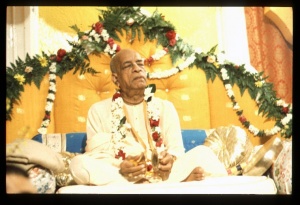CC Adi 4.107: Difference between revisions
m (1 revision(s)) |
No edit summary |
||
| Line 1: | Line 1: | ||
{{ | [[Category:Sri Caitanya-caritamrta - Adi-lila Chapter 04|C107]] | ||
<div style="float:left">'''[[Sri Caitanya-caritamrta|Śrī Caitanya-caritāmṛta]] - [[CC Adi|Ādi-līlā]] - [[CC Adi 4|Chapter 4: The Confidential Reasons for the Appearance of Śrī Caitanya Mahāprabhu]]'''</div> | |||
<div style="float:right">[[File:Go-previous.png|link=CC Adi 4.106|Ādi-līlā 4.106]] '''[[CC Adi 4.106|Ādi-līlā 4.106]] - [[CC Adi 4.108|Ādi-līlā 4.108]]''' [[File:Go-next.png|link=CC Adi 4.108|Ādi-līlā 4.108]]</div> | |||
{{CompareVersions|CC|Adi 4.107|CC 1975|CC 1996}} | |||
{{RandomImage}} | |||
==== TEXT 107 ==== | ==== TEXT 107 ==== | ||
<div | <div class="verse"> | ||
śeṣa-līlāya prabhura kṛṣṇa-viraha-unmāda | :śeṣa-līlāya prabhura kṛṣṇa-viraha-unmāda | ||
bhrama-maya ceṣṭā, āra pralāpa-maya vāda | :bhrama-maya ceṣṭā, āra pralāpa-maya vāda | ||
</div> | </div> | ||
| Line 12: | Line 16: | ||
==== SYNONYMS ==== | ==== SYNONYMS ==== | ||
<div | <div class="synonyms"> | ||
śeṣa- | ''śeṣa-līlāya''—in the final pastimes; ''prabhura''—of Lord Caitanya Mahāprabhu; ''kṛṣṇa-viraha''—from separation from Lord Kṛṣṇa; ''unmāda''—the madness; ''bhrama-maya''—erroneous; ''ceṣṭā''—efforts; ''āra''—and; ''pralāpa-maya''—delirious; ''vāda''—talk. | ||
</div> | </div> | ||
| Line 19: | Line 23: | ||
==== TRANSLATION ==== | ==== TRANSLATION ==== | ||
<div | <div class="translation"> | ||
In the final portion of His pastimes, Lord Caitanya was obsessed with the madness of separation from Lord Kṛṣṇa. He acted in erroneous ways and talked deliriously. | In the final portion of His pastimes, Lord Caitanya was obsessed with the madness of separation from Lord Kṛṣṇa. He acted in erroneous ways and talked deliriously. | ||
</div> | </div> | ||
| Line 26: | Line 30: | ||
==== PURPORT ==== | ==== PURPORT ==== | ||
<div | <div class="purport"> | ||
Lord Śrī Caitanya exhibited the highest stage of the feelings of a devotee in separation from the Lord. This exhibition was sublime because He was completely perfect in the feelings of separation. Materialists, however, cannot understand this. Sometimes materialistic scholars think He was diseased or crazy. Their problem is that they always engage in material sense gratification and can never understand the feelings of the devotees and the Lord. Materialists are most abominable in their ideas. They think that they can enjoy directly perceivable gross objects by their senses and that they can similarly deal with the transcendental features of Lord Caitanya. But the Lord is understood only in pursuance of the principles laid down by the Gosvāmīs, headed by Svarūpa Dāmodara. Doctrines like those of the nadīyā-nāgarīs, a class of so-called devotees, are never presented by authorized persons like Svarūpa Dāmodara or the six Gosvāmīs. The ideas of the gaurāṅga-nāgarīs are simply a mental concoction, and they are completely on the mental platform. | Lord Śrī Caitanya exhibited the highest stage of the feelings of a devotee in separation from the Lord. This exhibition was sublime because He was completely perfect in the feelings of separation. Materialists, however, cannot understand this. Sometimes materialistic scholars think He was diseased or crazy. Their problem is that they always engage in material sense gratification and can never understand the feelings of the devotees and the Lord. Materialists are most abominable in their ideas. They think that they can enjoy directly perceivable gross objects by their senses and that they can similarly deal with the transcendental features of Lord Caitanya. But the Lord is understood only in pursuance of the principles laid down by the ''Gosvāmīs'', headed by Svarūpa Dāmodara. Doctrines like those of the ''nadīyā-nāgarīs'', a class of so-called devotees, are never presented by authorized persons like Svarūpa Dāmodara or the six ''Gosvāmīs''. The ideas of the ''gaurāṅga-nāgarīs'' are simply a mental concoction, and they are completely on the mental platform. | ||
</div> | </div> | ||
__NOTOC__ | |||
<div style="float:right; clear:both;">[[File:Go-previous.png|link=CC Adi 4.106|Ādi-līlā 4.106]] '''[[CC Adi 4.106|Ādi-līlā 4.106]] - [[CC Adi 4.108|Ādi-līlā 4.108]]''' [[File:Go-next.png|link=CC Adi 4.108|Ādi-līlā 4.108]]</div> | |||
__NOTOC__ | |||
__NOEDITSECTION__ | |||
Revision as of 17:47, 22 August 2021

A.C. Bhaktivedanta Swami Prabhupada
TEXT 107
- śeṣa-līlāya prabhura kṛṣṇa-viraha-unmāda
- bhrama-maya ceṣṭā, āra pralāpa-maya vāda
SYNONYMS
śeṣa-līlāya—in the final pastimes; prabhura—of Lord Caitanya Mahāprabhu; kṛṣṇa-viraha—from separation from Lord Kṛṣṇa; unmāda—the madness; bhrama-maya—erroneous; ceṣṭā—efforts; āra—and; pralāpa-maya—delirious; vāda—talk.
TRANSLATION
In the final portion of His pastimes, Lord Caitanya was obsessed with the madness of separation from Lord Kṛṣṇa. He acted in erroneous ways and talked deliriously.
PURPORT
Lord Śrī Caitanya exhibited the highest stage of the feelings of a devotee in separation from the Lord. This exhibition was sublime because He was completely perfect in the feelings of separation. Materialists, however, cannot understand this. Sometimes materialistic scholars think He was diseased or crazy. Their problem is that they always engage in material sense gratification and can never understand the feelings of the devotees and the Lord. Materialists are most abominable in their ideas. They think that they can enjoy directly perceivable gross objects by their senses and that they can similarly deal with the transcendental features of Lord Caitanya. But the Lord is understood only in pursuance of the principles laid down by the Gosvāmīs, headed by Svarūpa Dāmodara. Doctrines like those of the nadīyā-nāgarīs, a class of so-called devotees, are never presented by authorized persons like Svarūpa Dāmodara or the six Gosvāmīs. The ideas of the gaurāṅga-nāgarīs are simply a mental concoction, and they are completely on the mental platform.